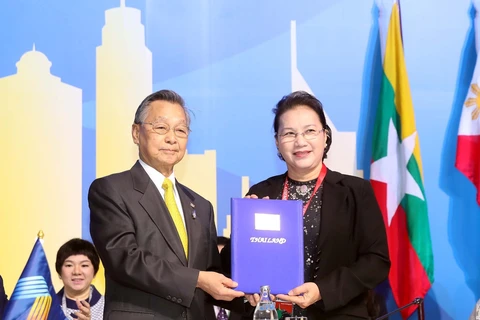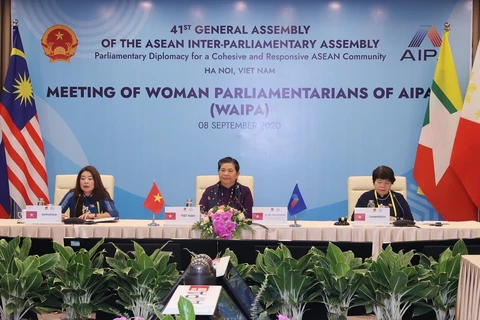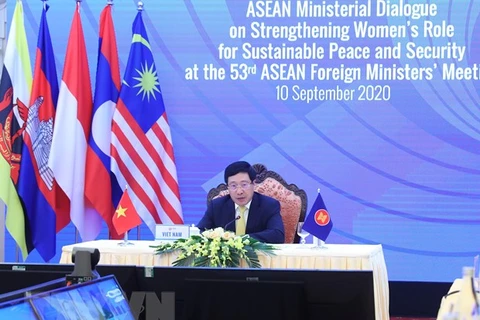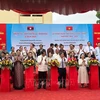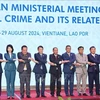 Vietnam has been among the leading countries in Asia-Pacific in recording marked progress in gender quality and women’s empowerment. (Photo: VNA)
Vietnam has been among the leading countries in Asia-Pacific in recording marked progress in gender quality and women’s empowerment. (Photo: VNA)
Hanoi (VNA) - Vietnam has been among the leading countries in Asia-Pacific in recording marked progress in gender quality and women’s empowerment over recent decades.
The country issued the Law on Gender Equality in 2006, which required that government agencies and all-level People’s Committees take responsibility for gender equality in State management.
Women currently account for 26.72 percent of deputies in the country’s National Assembly (NA), which is quite high regionally and globally. Many Vietnamese women now hold important posts in politics, the economy, and science.
Of note, nine women have been elected to the post of Secretary of provincial Party Committees for the 2020-2025 tenure, while eight of the 42 officials re-elected to this position are women.
 Nine women have been elected to the post of Secretary of provincial Party Committees for the 2020-2025 tenure. (Photo: VNA)
Nine women have been elected to the post of Secretary of provincial Party Committees for the 2020-2025 tenure. (Photo: VNA) The NA ratified the appointment of Nguyen Thi Hong last November as the new Governor of the State Bank of Vietnam (SBV); the first woman to take up the post.
Hong, 52, was the only candidate nominated and her appointment was backed by 97 percent of the legislature.
During its 10th session, the 14th NA adopted a resolution on joining UN peacekeeping operations and created a legal framework for promoting gender equality and enhancing women’s participation in such missions.
Vietnam has sent some 167,000 soldiers to the UN peacekeeping mission in South Sudan since 2014, with women making up 16 percent, according to Lieutenant Sa Minh Ngoc, one of the first female Vietnamese soldiers deployed on operations.
Women’s role in peacekeeping has not only been affirmed through their number but also through the quality of their work as well as their contributions to building trust and maintaining peace, she said.
Higher rankings in gender equality
 Gender equality is not only a fundamental human right but also a necessary foundation for a peaceful and prosperous society. (Photo: VNA)
Gender equality is not only a fundamental human right but also a necessary foundation for a peaceful and prosperous society. (Photo: VNA) The review report on the ten-year implementation of the Gender Equality Law in Vietnam by the Ministry of Labour, Invalids and Social Affairs and the UN Population Fund (UNFPA) in Vietnam states that the country is a signatory to numerous international instruments addressing gender equality, women’s rights, and women’s empowerment.
Gender equality is not only a fundamental human right but also a necessary foundation for a peaceful and prosperous society. Over recent decades, Vietnam has become one of the leading countries in the Asia-Pacific region in making significant progress on gender equality in many socio-economic fields.
Nguyen Thi Ha, Deputy Minister of Labour, Invalids and Social Affairs and Standing Vice Chairman of the National Committee for the Advancement of Women in Vietnam, said the country’s gender equality work has created a positive change in awareness and behaviour among Government leaders and officials as well as the community, contributing to enhancing the role and status of Vietnamese women in the family and in society.
A number of improved development indicators have seen Vietnam rise in rankings for gender equality, which is highly regarded by the international community, she added.
“During the 10 years of implementing the Gender Equality Law, Vietnam has become one of the countries in the Asia and the Pacific region to make a lot of progress on gender equality,” said Naomi Kitahara, UNFPA Representative in Vietnam. “We have seen remarkable achievements in women’s rights and leadership, notably in health and education and by strengthening legal and institutional frameworks.”
“As one of the 17 sustainable development goals (SDGs), gender equality and women’s empowerment are indispensable for all aspects of socio-economic life. Gender equality is not only a basic human right but also a necessary foundation for a peaceful and prosperous Vietnam. Without addressing the issue of gender equality, there is no way Vietnam can achieve the SDGs by 2030.”
“In Vietnam, we have seen remarkable progress on women’s rights and leadership in some areas, notably in access to education and maternal health, workforce participation, and in the strengthening of the legal and institutional frameworks for gender equality,” said UN Women Vietnam Head of Office Elisa Fernandez Saenz.
Vietnam, however, faces new challenges in gender equality due to the impact of the global economy, the strong development of Industry 4.0, natural disasters and climate change, and demographic changes.
Such challenges require that the country develop specific policies and actions to maintain its achievements and simultaneously address existing gender issues as well as emerging gender issues in the immediate future.
Its overall effort continues to demonstrate Vietnam’s strong commitment to achieving SDG 5 on gender equality and women’s empowerment./.

